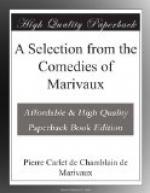[62] QUAND JE SEROIS AUTRE CHOSE, ‘Even should I be something more.’
[63] JE NE LAISSEROIS PAS QUE D’EN ETRE SURPRISE. See Le Jeu de l’amour et du hasard, note 109.
[64] C’EST QUE VOUS NE CONNOISSEZ QU’ELLE. A figure of speech conveying this idea: ‘You are very well acquainted with her.’
[65] OUI-DA. See le Jeu de l’amour et du hasard, note 21.
[66] CE N’EST PAS QU’IL N’Y AIT DU RISQUE, ’After all, there is some danger.’ Ce n’est pas que in the sense of apres tout may introduce either the indicative or the subjunctive with ne. The article of the partitive du is retained because of the affirmative character of the phrase.
[67] LA PLUPART. Some later editions print pour la plupart. The idea is the same.
[68] IL N’Y AUROIT QUE FAIRE DE, ‘I would have no need to.’ Compare le Jeu de l’amour et du hasard, note 141.
[69] PRENEZ. Used in the sense of supposez.
[70] NE LE VOILA-T-IL PAS, ‘Just see how (far from the point he is).’ See le jeu de l’amour et du hasard, note 135.
[71] UNIS, ‘Plain,’ ‘simple.’ Compare Le Jeu de l’amour et du hasard, note 205.
[72] QU’OUI. See Le Jeu de l’amour et du hasard, note 3.
[73] D’OU VIENT ... ME L’AVEZ-VOUS LAISSE IGNORER. This peculiar and somewhat awkward construction is not uncommon to Marivaux. See le Jeu de l’amour et du hasard, note 220. It would now be written que vous me l’avez laisse ignorer, etc.
[74] J’ENTENDS. See le Jeu de l’amour et du hasard, note 247.
[75] IMAGINATION. See le Jeu de l’amour et du hasard, note 44.
[76] TOUT A L’HEURE = tout de suite, not a modern use. See les Fausses Confidences, note 152.
[77] J’ENTENDS. See le Jeu de l’amour et du hasard, note 247.
[78] AVANT QUE DE. See le Jeu de l’amour et du hasard, note 93.
[79] PASSONS NOTRE CONTRAT, ‘Let us sign the marriage settlements to-day.’
[80] ICI, an early use instead of _-ci_.
[81] HETEROCLITE. See le Jeu de l’amour et du hasard, note 18.
[82] RAGOUTANT. See le Jeu de l’amour et du hasard, note 102. The word has seemed too coarse to the actors of to-day, and has been replaced by agreable.
[83] PASSER. See note 79.
[84] TOUT A L’HEURE. See note 76.
[85] JE N’AI QUE FAIRE DE SORTIR, ‘I do not need to go out.’ Compare le Jeu de l’amour et du hasard, note 140.
[86] CETTE SOTTE! equivalent to quelle sotte. It will be noticed that the French make a very large use of the demonstrative where in English the article would be employed. In such cases as the present the English would be: ‘What a ...’
[87] AVEC LE MEDECIN PAR-DESSUS. Doctors have been the butt of jests from time immemorial. Compare: “Nuper erat medicus; nunc est vespillo Diaulus: Quod vespillo facit, fecerat et medicus” (Martial, I, 1, Epigram xlviii).




